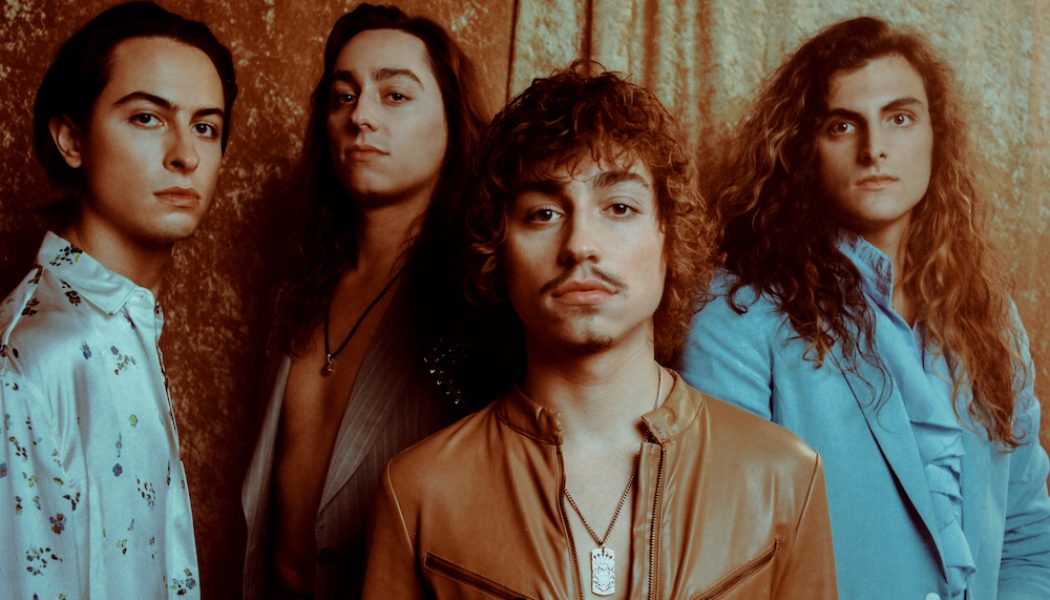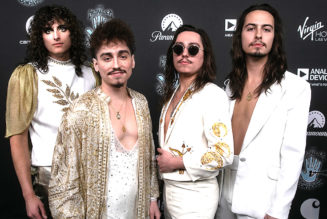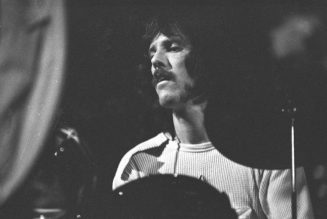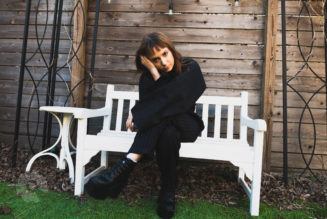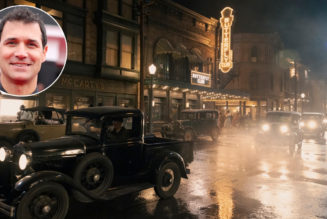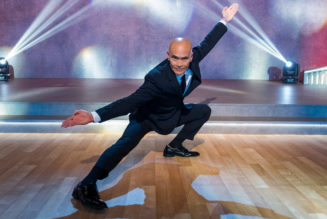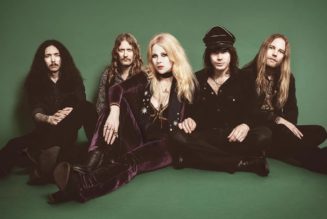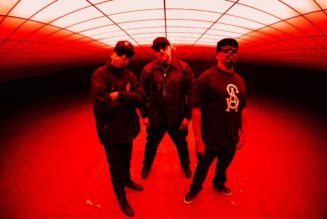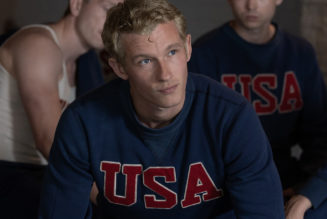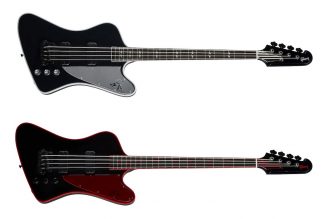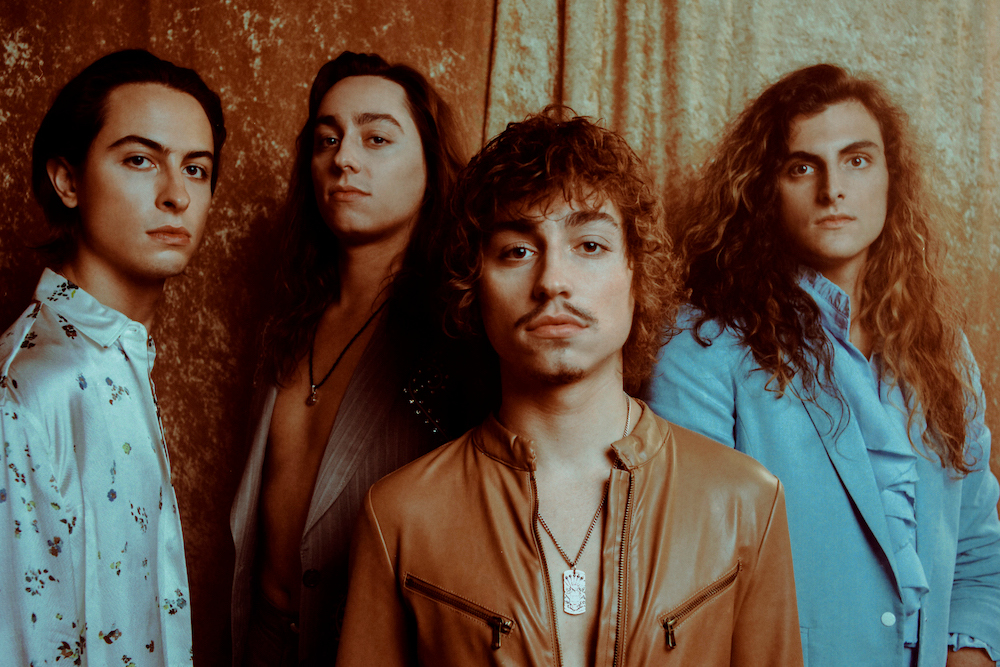
“Nobody wants to hear that shit,” Greta Van Fleet’s Sam Kiszka says, playfully interrupting a question about progressive rock.
He has a point: Most people don’t.
Outside of the cape-wearing allegiant, prog remains one of music’s most derided movements — still a frequent target of critical mockery, decades after its zenith of influence. But Greta Van Fleet’s second LP, The Battle at Garden’s Gate, is a “progressive” album — both in the classic sense (longer songs, more complex arrangements, strings both live and mellotron-derived) and as part of the Michigan quartet’s own creative arc.
Kiszka, the band’s 22-year-old bassist and keyboardist, was surprised when people starting making that observation. “I thought about it a lot, and I was like, ‘What?’” he tells SPIN. “But I think people are hearing our boredom with more traditional rock music, like [their 2017 single] ‘Highway Tune’ — something that’s very simple but very effective. AC/DC was so successful and made so many people happy because of this absolute, complete simplicity of the music. There’s nothing wrong with that, but it’s not what we want to do. We did that for years, and we got bored with it. It’s all about challenging ourselves.”
Critics will probably find plenty of other classic rock reference points here, from the dramatic Hammond organ intro of opener “Heat Above” to the extended, psychedelic guitar solo on the nine-minute closing epic “The Weight of Dreams.” (To haters’ delight, the band also hasn’t dampened their love of extravagant fashion — if anything, they appear to have doubled-down on it.) But with Garden’s Gate, Greta Van Fleet have organically matured beyond the Led Zeppelin Comparisons Heard ‘Round the World.
Working with mega-producer Greg Kurstin (Adele, Paul McCartney, Foo Fighters), the band zeroed in on “cinematic” ideas — building on the widescreen elements of their debut LP, 2018’s Anthem of the Peaceful Army.
“I don’t think we ever would have recorded The Battle at Garden’s Gate two years ago because we would have been flipping the script,” Kiszka says. “That would have been an injustice to our fans. It’s the natural evolution. Garden’s Gate is Greta Van Fleet’s coming of age.”
The multi-instrumentalist spoke to SPIN about blocking out the noise, chasing their own flavor of progressive rock and discovering what sounds may sprout beyond Garden’s Gate.
SPIN: It’s funny to me that you guys made a more cinematic album with Greg Kurstin, a versatile producer — but not an obvious choice for a project like this. Did you immediately know you wanted to work with him?
Sam Kiszka: Going into Garden’s Gate, we knew very little of what was going to happen. But we knew one thing, and that’s the one word you said: “cinematic.” We were seeking to make the record we always wanted to make. I’m not sure if it was our following or the lack of notoriety. But we never had the facilities to create this record — to have it be understood the way we felt it should be.
This was definitely a passion project going into it. We were really critical about who we picked as a producer on this record, and Greg was the first guy brought to our attention. People said, like you said, that he’s a musical chameleon, and we were attracted to the versatility — the idea that he could work with Foo Fighters and service them just as well as Paul McCartney or Adele.
If you look at those names on a list, it’s like, “How did he manage to find common ground with all those people?”
It’s because he’s not a one-trick pony. There are a lot of producers like that, and there’s nothing wrong with that, but that’s not what we were looking for. We really wanted dynamics. People forget about the ups and the downs, the ebbs and the flows. If art imitates life, you can’t just have a [one-dimensional] song. Greg has an all-around musical brain: being able to think really in-depth about the tone of the snare, the bass part and what it’s doing with the counter-melody and the guitar. Also being able to work with [singer Josh Kiszka] really closely. Vocals are a very intimate thing, and it’s a lot of pressure.
I know that Greg helped out during your initial sessions by picking up bass, allowing you to record keys with the band and get that live feel. Did you end up going back and overdubbing your own bass parts later on? How did that impact what you played?
That’s exactly it. It also threw in a different flavor. I did some different things on bass based on what he initially laid down. I’d go in and re-track that stuff. The purpose of having Greg in the band was to have the feel of a bass player. He’s a much better keyboard player than myself, but I stuck him with bass because I was going to end up playing both either way. I wanted the keys to have that live feel. It also added a slightly different element in the mix — you can hear it in the drum track. We want a producer who can add an unknown [element], who can give us something we haven’t seen before.
There were seeds of this more cinematic style on Anthem, particularly songs like “Age of Man” and “Brave New World.” Back then, did you feel like you had to hold back? Would you have made an album like Garden’s Gate if you felt the audience wanted it?
That’s a very good question. I think you kinda nailed it. The reason we didn’t is because we [started with] this double-EP [2017’s From the Fires] — some rock and roll songs and kind of a sweeter, folky country thing. That was all the dynamics that we had. Anthem was a good stepping stone to show our different interests and musical stylings: bringing in different things, having a power ballad, a sweet ballad at the end. That’s a very natural growth.
A nice byproduct of this bigger scope is that people can’t focus so much on the Led Zeppelin comparisons that dominated the last press cycle.
People have been saying, “Was it tough with the pressure of releasing your second full-length?” No, it wasn’t. This is exactly what we wanted to do, and we had a shitload of fun. The worst thing about the Led Zeppelin comparisons is that, deep down, you think, “Are we that?” It’s nothing someone should ever feel, but it was definitely back there: “Is this what we are?” Then we make this record, and it’s very liberating because we have something to prove to ourselves: “This is what we’re capable of. This is what we do. This is very new, and it’s relevant.” We’re very proud of it. We all pushed ourselves to the limit.
I know some of these songs have been around a long time. What’s the oldest one here?
I’d say “Heat Above” was written around the same time as “Flower Power” and “Highway Tune.” We workshopped it to put it on our first EP, but once again, just like the story of the album itself, it never found its place. So it was re-homed onto this record. It was reborn. It was the same attitude and idea, but we just modernized it. Rather than having a song with three or four chords all the way through, we added a lot of changes. It represents the maturity of our musicianship and composition.
I’m not sure we had the prowess in a lot of those fields to make this record two years ago. We learned a lot in the making of Anthem, and we learned a lot in the making of Garden’s Gate. I don’t think we could have made this record quite the way we wanted to, and I think that’s why we waited.
In that same interview, you said, “When you get too far away from being a listener and just being a player, that kinda steps into the bounds of progressive rock and stuff that is much less digestible.” That quote surprised me because your new album is much proggier. There are more elaborate arrangements and chord progressions, lots of instrumental sections, longer songs. Are you influenced at all by the classic prog-rock bands like Genesis, Yes and Pink Floyd?
I think perhaps Pink Floyd is the closest thing where I love the progressiveness. When I hear the word “progressive rock,” I think of bands like Yes and Rush and perhaps Genesis. I think of [vocalizes wild riffs in a weird time signature]. It’s crazy rhythms and overwhelming and too much. But I love the idea of being progressive — you take all this knowledge from the past and marry it with the current times, and you get something from the future.
Maybe this is just your band’s take on prog-rock.
I don’t want to hear about all this stuff we want to keep around because people still like it. I don’t give a shit about that. I want to take that idea and push it into the future.
For rock bands, recording with strings is usually a major league moment — you typically have more budget and more time. But sometimes that combination feels kinda corny, like the band just slapped on some strings because they could. These orchestrations, however, feel fairly integral to the songs, like on “Broken Bells.” Were you determined to have strings?
I think the whole idea there was very cinema-based. We went into the album with that idea, but you can’t really have a huge fucking sound without that giant widescreen stereo orchestra. We had a four-piece, and we just dubbed them two or three times on each track, whatever we had time for. We mixed them with mellotron strings too, and I think that’s really interesting. You have these tapes from the 1930s or ’40s, and you blend them with this very real string section. It’s a conglomerate between the old and new. We wanted texture. We wanted to make it to where, if you close your eyes, you can see the scene. Greg’s string arrangements were perfect, especially since he was there for the entire process.
In 2019, you told NME that Garden’s Gate was “the next step in the evolution of what we want to do.” Do you already have a pretty full vision of what that could be?
I think this is something we will definitely revisit throughout our careers. But throughout the eight years or so of being a band, our whole goal was to get to The Garden’s Gate. So now it’s time for something different. We saw the mountaintop, and where are you supposed to go from there? I think we’ll probably find something that is very truthful and raw and imperfect.
After making The Garden’s Gate, it almost feels like we were cheating a bit. It’s almost like it was too easy — like you could hide your performance because there are strings and all these different tracks. It was fun as fuck building these songs — you can just layer it and layer it, like you’re cooking dinner. Perhaps the next record will be something where can’t hide anything: drums, bass, guitar, lead vocal. I think it’ll be something very stripped down — think like [Neil Young’s] On the Beach.
